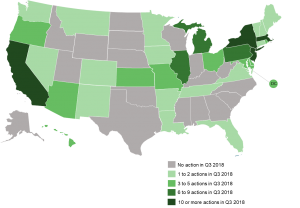The 50 States of Electric Vehicles: 32 States and DC Took Action on Electric Vehicles During Q3 2018
Raleigh, NC – (November 7, 2018) The N.C. Clean Energy Technology Center (NCCETC) released its Q3 2018 edition of The 50 States of Electric Vehicles. The quarterly series provides insights on state regulatory and legislative discussions and actions on electric vehicles and charging infrastructure.
The report finds that 32 states and the District of Columbia took actions related to electric vehicles and charging infrastructure during Q3 2018 (see figure below), with the greatest number of actions relating to Level 2 charging station deployment, followed by electric vehicle rate tariffs, rebate programs, and DC fast charging station deployment.
The report notes three trends in electric vehicle activity apparent or emerging in Q3 2018: (1) utilities proposing demand charge alternatives for fast charging stations, (2) electric bus investment ramping up, along with vehicle-to-grid testing, and (3) utilities collecting data on electric vehicle charging patterns.
A total of 211 electric vehicle actions were taken during Q3 2018. New Jersey, California, New York, and Massachusetts took the greatest number of actions during the quarter, accounting for over half of the quarter’s activity.
Q3 2018 Legislative and Regulatory Action on Electric Vehicles

“States continue to anticipate more electric vehicles on the road as a growing number of medium and heavy duty models are announced,” noted Allison Carr, Clean Transportation Specialist at NCCETC. “We’re seeing states and utilities work to advance electrification of medium and heavy duty vehicles by offering incentives, building out charging infrastructure, and testing vehicle-to-grid capabilities.”
The report notes the top electric vehicle actions taken during the quarter were:
- The Missouri Court of Appeals reversing a Public Service Commission decision on charging station regulation;
- Pepco filing its Transportation Electrification Program proposal with the DC Public Service Commission;
- Massachusetts and Rhode Island regulators approving electric vehicle programs for National Grid;
- PSE&G New Jersey filing a $261 million electric vehicle program proposal; and
- California utilities filing proposals to deploy charging infrastructure at schools and state parks and beaches.
“Utilities are playing a significant role in accelerating the build-out of charging infrastructure,” observed Autumn Proudlove, Senior Manager of Policy Research at NCCETC. “In addition to directly deploying infrastructure, utilities are proposing demand charge alternatives to encourage development of fast charging stations and launching rebate programs to reduce upfront costs.”
View the 50 States of Electric Vehicles Q3 2018 Executive Summary
View and Purchase the 50 States of Electric Vehicles Q3 2018 FULL Report
View other 50 States Reports – Solar, Grid Modernization and Electric Vehicles
About the N.C. Clean Energy Technology Center
The N.C. Clean Energy Technology Center, as part of the College of Engineering at North Carolina State University, advances a sustainable energy economy by educating, demonstrating and providing support for clean energy technologies, practices and policies. It serves as a resource for innovative, sustainable energy technologies through technology demonstration, technical assistance, outreach and training. For more information about the N.C. Clean Energy Technology Center, visit: http://www.nccleantech.
MEDIA CONTACT: Shannon Helm, NCCETC, shannon_helm@ncsu.edu